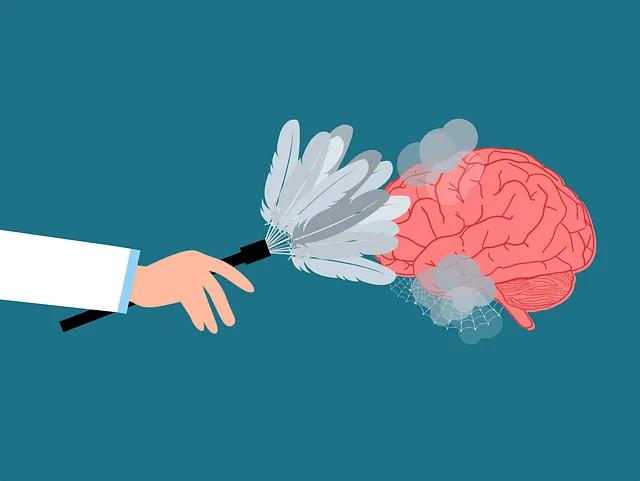Mental health advocacy centers like the Golden Kaiser Permanente play a vital role in fostering community well-being through tailored, accessible care. By challenging stigma and implementing evidence-based practices, these centers empower individuals using strategies such as conflict resolution, Mind Over Matter principles, and comprehensive services addressing depression, anxiety, and trauma. Community engagement, awareness campaigns, and policy interventions drive systemic change, leading to resilient communities where everyone has the chance to flourish. Measuring impact through KPIs, qualitative feedback, and societal analysis ensures programs like these create lasting positive changes tailored to diverse populations' unique needs.
Mental health advocacy initiatives play a pivotal role in fostering community well-being, ensuring access to support systems for all. This article explores the critical aspects of mental health activism, highlighting the pioneering work of the Golden Kaiser Permanente Mental Health Center. We delve into effective strategies, emphasize partnership building with local communities, and discuss measurement techniques to evaluate the impact of these programs. By examining these key elements, we aim to inspire and guide further advocacy efforts.
- Understanding Mental Health Advocacy: A Key to Community Well-being
- The Role of Golden Kaiser Permanente Mental Health Center in Advocacy Efforts
- Strategies for Effective Mental Health Advocacy Initiatives
- Building Partnerships: Collaborating with Local Communities and Organizations
- Measuring Impact: Evaluating the Success of Mental Health Advocacy Programs
Understanding Mental Health Advocacy: A Key to Community Well-being

Mental health advocacy is a powerful tool for fostering community well-being, and it plays a pivotal role in ensuring that individuals receive the support they need to thrive. At the core of this concept lies the understanding that everyone has unique mental health experiences and challenges. Advocacy initiatives aim to amplify these voices, challenge stigma, and promote equitable access to quality care. The Golden Kaiser Permanente mental health center by owner is an excellent example of a dedicated advocacy hub where professionals champion Mental Health Policy Analysis and Advocacy, employing Conflict Resolution Techniques to navigate complex issues.
By adopting Mind Over Matter Principles, advocates empower individuals to take charge of their mental well-being. This approach encourages open dialogue, education, and the implementation of evidence-based practices. Through community engagement, awareness campaigns, and policy interventions, advocacy groups can drive systemic change, ensuring that mental health services are accessible, affordable, and culturally sensitive. Such efforts ultimately contribute to building resilient communities where everyone has the opportunity to flourish with proper support for their mental health needs.
The Role of Golden Kaiser Permanente Mental Health Center in Advocacy Efforts

The Golden Kaiser Permanente Mental Health Center stands as a beacon of hope and healing for many within its community. As a leading mental health facility by owner, it has carved out a significant role in advocacy initiatives aimed at improving access to care and raising awareness about various mental health concerns. Through comprehensive services that span across depression prevention, anxiety management, and trauma support services, the center offers a holistic approach to well-being.
Beyond direct patient care, Golden Kaiser Permanente actively engages in communication strategies that bridge the gap between healthcare providers and the public. Educational workshops, community outreach programs, and peer support groups are some of the initiatives that empower individuals to recognize mental health issues early on. This proactive stance not only ensures timely interventions but also fosters a culture of open dialogue surrounding mental health, thereby reducing stigma and promoting overall resilience within the population it serves.
Strategies for Effective Mental Health Advocacy Initiatives

Mental health advocacy initiatives require a multi-faceted approach to be truly effective. Firstly, Golden Kaiser Permanente mental health center by owner can serve as a model for community engagement and accessible care. Such centers focus on providing comprehensive services tailored to diverse populations, fostering an environment where individuals feel comfortable seeking support.
Additionally, burnout prevention is crucial through public awareness campaigns development that educate the public about mental health challenges and dispel stigma. Communication strategies should be tailored to reach diverse audiences, leveraging both traditional media and digital platforms. Engaging with policymakers can also lead to legislative changes that improve access to mental health services and support programs.
Building Partnerships: Collaborating with Local Communities and Organizations

Building strong partnerships is a cornerstone of successful mental health advocacy initiatives, especially when collaborating with local communities and organizations. The Golden Kaiser Permanente mental health center by owner exemplifies this approach, fostering connections that amplify their impact. By engaging community leaders, non-profits, schools, and faith-based groups, the center leverages collective resources to advance mental wellness. These partnerships drive the development of tailored public awareness campaigns, ensuring messages resonate deeply with diverse populations.
Moreover, such collaborations enable the integration of healthcare provider cultural competency training. This not only enhances the quality of care but also builds trust between service providers and communities they serve. Together, these strategies create a network that holistically addresses mental health challenges, reflecting a commitment to making mental wellness accessible and supportive for all.
Measuring Impact: Evaluating the Success of Mental Health Advocacy Programs

Measuring impact is a crucial aspect of evaluating the success of mental health advocacy programs. Initiatives such as those at the Golden Kaiser Permanente mental health center by owner focus on more than just providing services; they aim to foster long-lasting positive changes in individuals and communities. By implementing robust evaluation frameworks, these programs can assess the effectiveness of their interventions, ensuring that resources are allocated efficiently and effectively. This involves tracking key performance indicators (KPIs), collecting qualitative feedback from participants, and analyzing the broader societal impact of mental health advocacy initiatives.
Self-Care Practices and Compassion Cultivation Practices form a significant part of these evaluations. Mental Health Education Programs Design play a pivotal role in empowering individuals to take charge of their well-being. Through surveys, interviews, and community engagement metrics, advocates can gauge the adoption and benefits of self-care strategies, the spread of mental health literacy, and the overall improved resilience within communities. This data-driven approach not only helps in refining existing programs but also guides future advocacy efforts to better address the unique needs of diverse populations.
Mental health advocacy initiatives, such as those facilitated by the Golden Kaiser Permanente Mental Health Center, are vital for fostering community well-being. By understanding the importance of advocacy and employing effective strategies, we can create a tapestry of support that navigates individuals towards better mental health outcomes. Collaboration with local communities and organizations is key to building a robust network, ensuring programs reach those who need them most. Measuring impact allows us to refine and enhance these initiatives, ultimately revolutionizing mental healthcare access and quality. The Golden Kaiser Permanente Mental Health Center’s leadership in this arena serves as a testament to the power of advocacy in transforming lives.






